Cathy Capozzoli, Three Works
Tiny Messengers
I stop at the edge of my dim kitchen that morning, eyes slowly focusing on something unusual in an otherwise familiar scene. The pattern on the linoleum seems darker and more finely detailed. Suddenly I remember an exterminator’s van parked outside the house next door—which shares a common wall with mine—the day before. I am witness to hundreds of escaping ants taking up residence with me, covering the kitchen floor, embroidery in motion.
I am unprepared for this. I silently recant my “no pesticides” vow and wish for a can of Raid. But it is six in the morning, snowing, and I need to get to my desk in the extra bedroom. I step around the tiny, deliberate creatures to make tea. I’ll work on this later.
By mid-afternoon, the kitchen floor is teeming, and I am ready to act. I reach for the Dustbuster, turn it on and point nozzle toward linoleum, vacuuming a swath of ants about three feet long and three inches wide. Remembering when thousands of chickens were destroyed in Hong Kong because of an avian flu and Buddhist monks gathered to pray for the birds, I figure I vacuumed about 100 ants, so I say “I’m sorry” one hundred times, and try to really mean it.
The remaining ants move in quickly to fill the void. I pull the nozzle off the Dustbuster to see ant bodies curled on themselves and tangled in the dust. I return to work at my desk, reaffirming “no pesticides” and adding a postscript: to live with the ants in peaceful coexistence as sentient beings, using the Dustbuster only to clear the kitchen floor of any crumbs, so as not to encourage them.
But my tolerance for my refugee roommates wanes as the ants begin to fan out through the house. On white bathroom tile, even one tiny ant stands out like a boulder. He ambles across the floor, and I meet him head on with a tissue, which I crumple and drop in the bowl.
A full two hours later, I return and look down to find the ant still swimming. I rescue him and marvel at the strength of the will to live. But that night, all night, I toss and turn, my skin crawls. I dream of ants everywhere: in my cereal bowl, in the dryer, in my underwear drawer.
Next morning, a dream interpretation book tells me that ants are ancient symbols of the sacred. In living both under and above ground, they know the secrets of both worlds. OK, so they can stay.
Over time, I begin to welcome their presence. I greet them in the mornings. I learn their preferences for location, activity and food. These tiny messengers who remind me to stay calm and stick to my values are teaching me a new respect for all creatures, and our mutual need to exist in a toxin-free world.
I think of them as “my” ants. But come spring, as quickly as they came that one snowy morning, they are gone. And in their going, another lesson: in holding on, whether to old doubts or new friends, I need to let go. Will I remember that next time?
— Cathy Capozzoli, from Lake Effect Literary Journal
August After Dark
Today’s sun filled the air with unburnt sage.
My breath is not enough to move a branch.
Only the night has flowers that bloom, way up there next
to the bird’s nest in the prickly arms of the old saguaro.
That cat is feathered feet rising silently over the sand.
Inside, I turn the window blinds from open,
revealing the light and dark of the stars. My eyelids
will remain until dawn then blink those lesser colors.
— Cathy Capozzoli, from the poem-ghazal collection “Solstice Windows,” first published in Blue Guitar Magazine + nominated for the Pushcart Prize
Blood at Boynton Canyon
In silence, I hear words
calling themselves into lines,
each one her own world
like a cooling night in the canyon
where a lone pipe stands yellow proud and stationary in the wind.
I’ve known these lines for a long spell—
each a lifetime of momentary redemptions
one layered upon the last
in the race around my veins.
Meanwhile, cottonwoods
weep dry tears and want for rain.
Sun rays carry this evening’s birds
to me—once far away friends
who now need days to sip the water.
— A Free Verse Poem by Cathy Capozzoli
Sherman Souther, Three Works
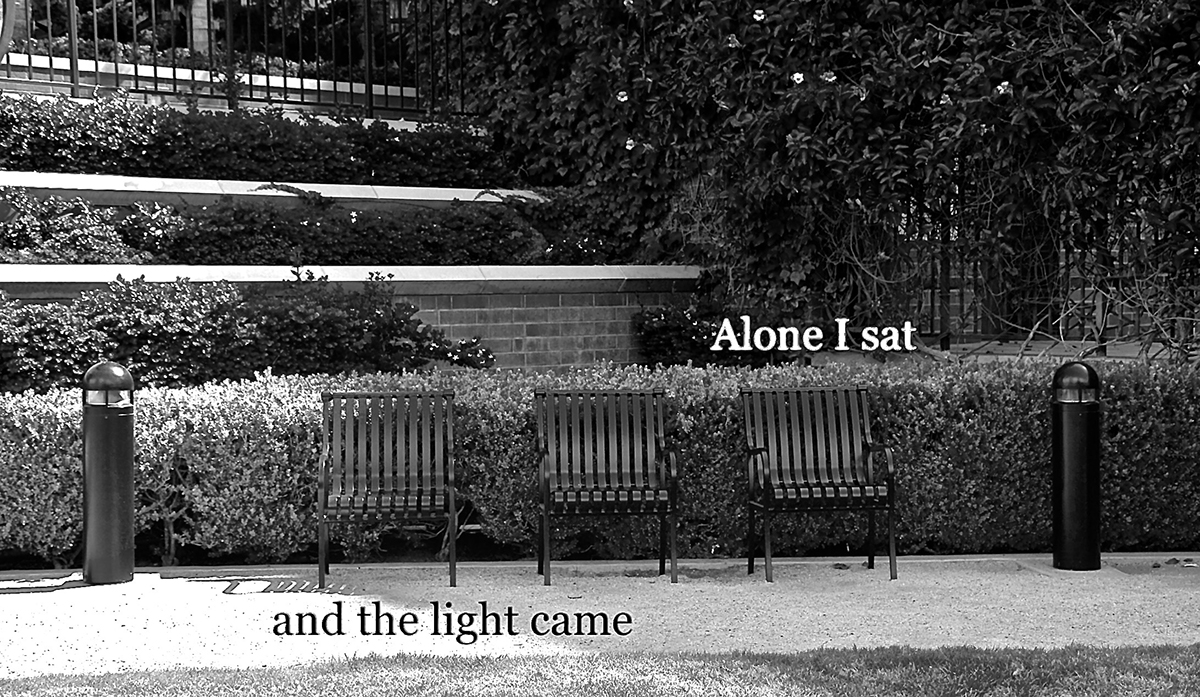
—photo and type enhancements by Sherman Souther
The Station Works, One
Were there not
Color…
Gray
Would be a different
Flower
—A Modern Haiku by Sherman Souther
The Cello
In punctuation
I was trained to believe
To resist the inversion
of verbs
To embrace the long line
Interrupted
But night came \ and the cello
Leathers and the lugubrious lamentations\ linear but
With their own complications here and afar in the darkness
The arpeggios worked in counterpoint
This after all was the desert\ sand where all the green used to be
You ask why it is always night and where did the day go \ the mountains are near and sparse
Would I knew
There is less evidence for a shift in the land here
And there movement mattered most \ for me and for most of those years
And now the dog breathes
and I too
\Softly\
She means that to me \ and so much more than so many
Then or now
But…
Only a few would feel what I know
—A Free Verse Poem by Sherman Souther
Our Publications
Cathy Capozzoli
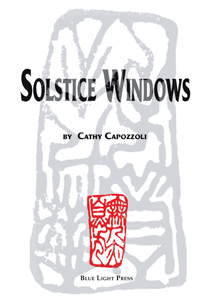 |
Solstice Windows, a collection of ghazals, which are an ancient Persian poetic form. Written in couplets, the poems consist of tiny stanzas linked like seeds on a necklace. The 19 poems in Solstice Windows embrace facets of consciousness between restlessness and awareness. Four of these poems were individually nominated for the Pushcart Prize. Published by Blue Light Press. |
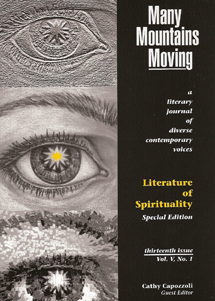 |
Many Mountains Moving: The Literature of Spirituality, a collection of contemporary creative works from 88 writers and artists from six countries and diverse spiritual traditions. Published by Many Mountains Moving, Inc. |
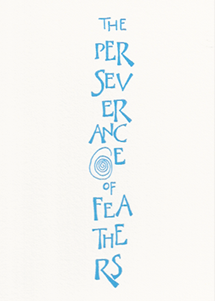 |
The Perseverance of Feathers, a single poem about being a writer hand-letterpressed on a poetry broadside by Chax Press. View full size |
 |
Sleeping, I Saw Us, a note card made in collaboration, holds a line from one of Cathy’s poems, “The Other Side of Music” and a hand-lettered illustration by visual artist Laurie Doctor. Printed by Twisted Limb. |
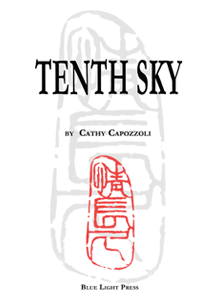 |
Tenth Sky, a collection of prose poems, published by Blue Light Press. |
Sherman Souther
 |
Surgical ‘Bru Ez, (pronounced bru-eez), a collection of 34 prose poems, is an exploration of observation, memory, and the sounds of words. Published by Tin Fish Press. |
